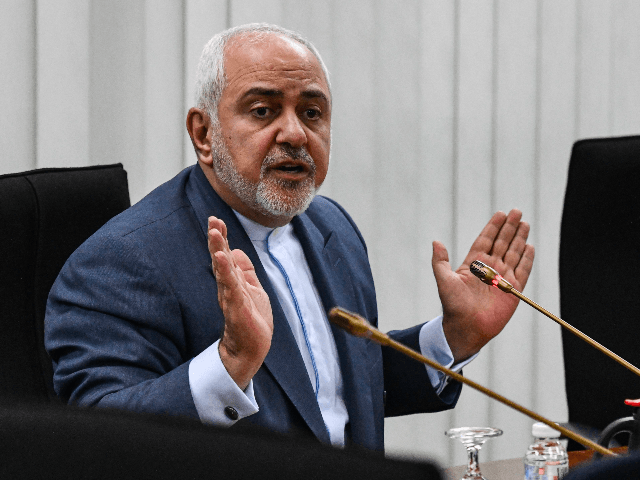Iran’s Foreign Ministry pointedly noted on Tuesday that only one of its Gulf neighbors, Saudi Arabia, had not publicly condemned the assassination of Mohsen Fakhrizadeh, the head of Iran’s nuclear weapons program.
Foreign Minister Mohammad Javad Zarif mentioned Saudi Arabia, alongside the United States and Israel, in a post about Fakhrizadeh’s death this weekend, accusing all three of intentionally fostering chaos in the Middle East to hurt the Iranian economy.
Fakhrizadeh, identified by the Israeli government as the “father” of Iran’s nuclear weapons program, died on Friday after being attacked in his vehicle in broad daylight. Iranian officials claimed his killers used Israeli remote-controlled munitions and “electronic devices” to kill him. Multiple senior members of the Iranian Islamic regime and military have accused Israel directly of the assassination; Israeli officials have not claimed any involvement and no individual or group has taken responsibility for the attack.
Iran is technically bound by the 2015 Joint Comprehensive Plan of Action (JCPOA), or Iran nuclear deal, to limit its uranium enrichment and weapons development. It has consistently violated the deal in the past five years, however, and explicitly stated it would do so after President Donald Trump withdrew the United States from the agreement. The Iranian Parliament passed a law Tuesday in response to Fakhrizadeh’s death that will mandate a significant increase in uranium enrichment. Without Fakhrizadeh, however, Iran lacks the necessary scientific manpower to swiftly build a bomb.
Iranian officials regularly threaten to attack and destroy the entire state of Israel, making a nuclear-armed Iran a particularly severe threat to that nation. Iran is also regularly at odds with regional rival Saudi Arabia, however, the government that serves as custodian of the holiest sites in Islam: Mecca and Medina. The Iranian Shiite regime does not consider the Saudi Sunni leadership legitimate and has openly challenged Saudi claims to administering those cities.
Iranian Foreign Ministry spokesman Saeed Khatibzadeh targeted Saudi Arabia again on Tuesday, not mentioning the country by name but noting that it had not expressed any condemnation for Fakhrizadeh’s killing.
“Regarding Dr. Fakhrizadeh’s martyrdom, we received a torrent of condemnations from countries in different parts of the region,” Khatibzadeh said. “In the Persian Gulf, all states but one condemned [the assassination], while some denounced it using harsh rhetoric. It similarly elicited condemnations from the East, West, and North.”
The state-run PressTV news agency noted that Saudi Arabia was the country in question.
The Saudi representative to the United Nations, Abdullah bin Yahya Al-Moallemi, urged “restraint” in response to the killing in remarks Tuesday.
“Targeting any Muslim scientist will harm the whole Muslim Ummah,” Al-Moallemi asserted. “We urge Iran to demonstrate its goodwill to the international community over its nuclear program so that it does not endanger its children and scientists in this way.”
The Saudi government has not, however, independently condemned the attack through any official statement at press time.
“They can say whatever they want,” the Iranian Foreign Ministry spokesman said in response to the call for restraint. “Iran will deliver a proportionate, independent response that will [inflict] maximum pain on those who ordered and perpetrated [the crime].”
Zarif, the foreign minister, pointed a finger at Saudi Arabia regarding the assassination in an Instagram post on Monday.
“The US, Saudi Arabia, and Israeli regimes are struggling to create tensions so that to ruin the conditions fostered to lift the sanctions imposed on Iran,” Zarif said, in the greater context of condemning Fakhrizadeh’s attack, making it clear his accusation was not a general one.
The foreign minister went on to accuse the three countries of a “psychological war against Iran,” according to Iranian state media.
“[Secretary of State Mike] Pompeo’s trips to the region, the trilateral meeting in Saudi Arabia and Netanyahu’s statements all point to this conspiracy that unfortunately took form in Friday’s cowardly terrorist move and martyrdom of one of the country’s top executives,” Zarif claimed, referring to an alleged meeting between Saudis and Israelis that both governments denied happened. Pompeo did visit Riyadh last week.
Adel al-Jubeir, the Saudi foreign minister, responded to Zarif via Twitter on Tuesday, calling him “desperate to blame the Kingdom for anything negative that happens in Iran.”
“It is not the policy of Saudi Arabia to engage in assassinations,” al-Jubeir claimed, accusing Iran of killing “many” people in assassinations since 1979.
Members of Iran’s Islamic Revolutionary Guard Corps (IRGC), a U.S.-designated terrorist organization, immediately vowed “severe revenge” in response to Iran losing its top nuclear scientist.
“The blind-hearted enemies of the Iranian nation, especially those who designed, perpetrated and supported this crime, should know that such crimes will not undermine the Iranians’ will and determination to continue this glorious and powerful path, and that a severe revenge and punishment is put on the agenda,” Major General Hossein Salami, the head of the IRGC, said last week.
Salami blamed Israel — “the fake, terrorist and infanticide Zionist regime” — for the apparent assassination.

COMMENTS
Please let us know if you're having issues with commenting.